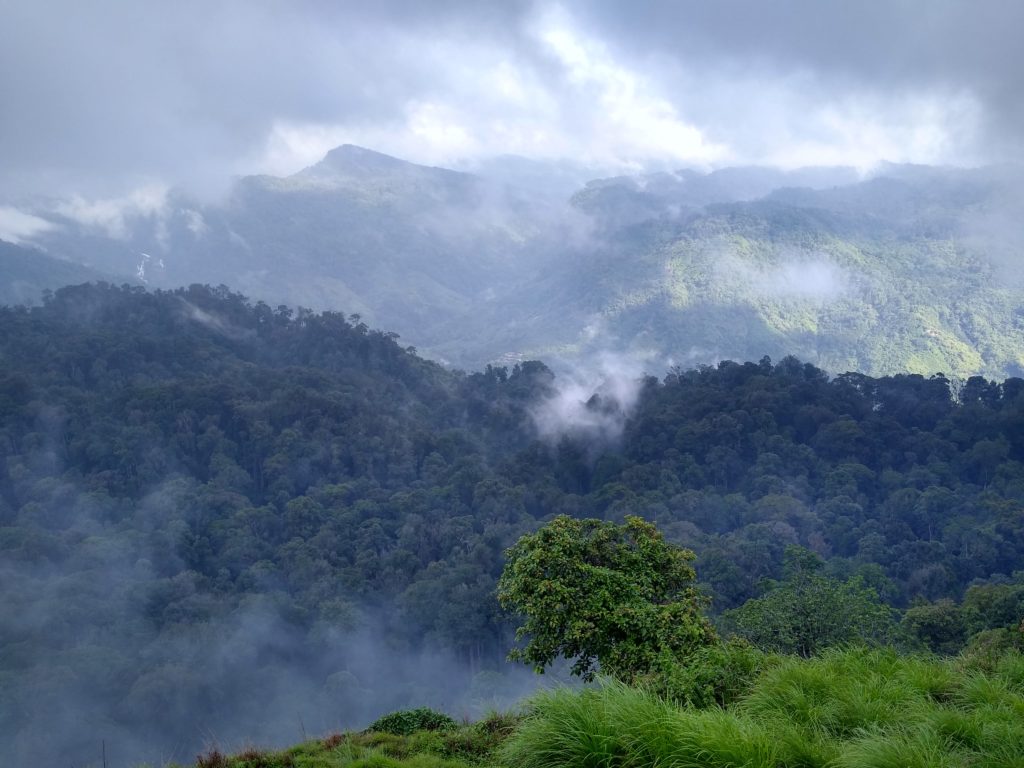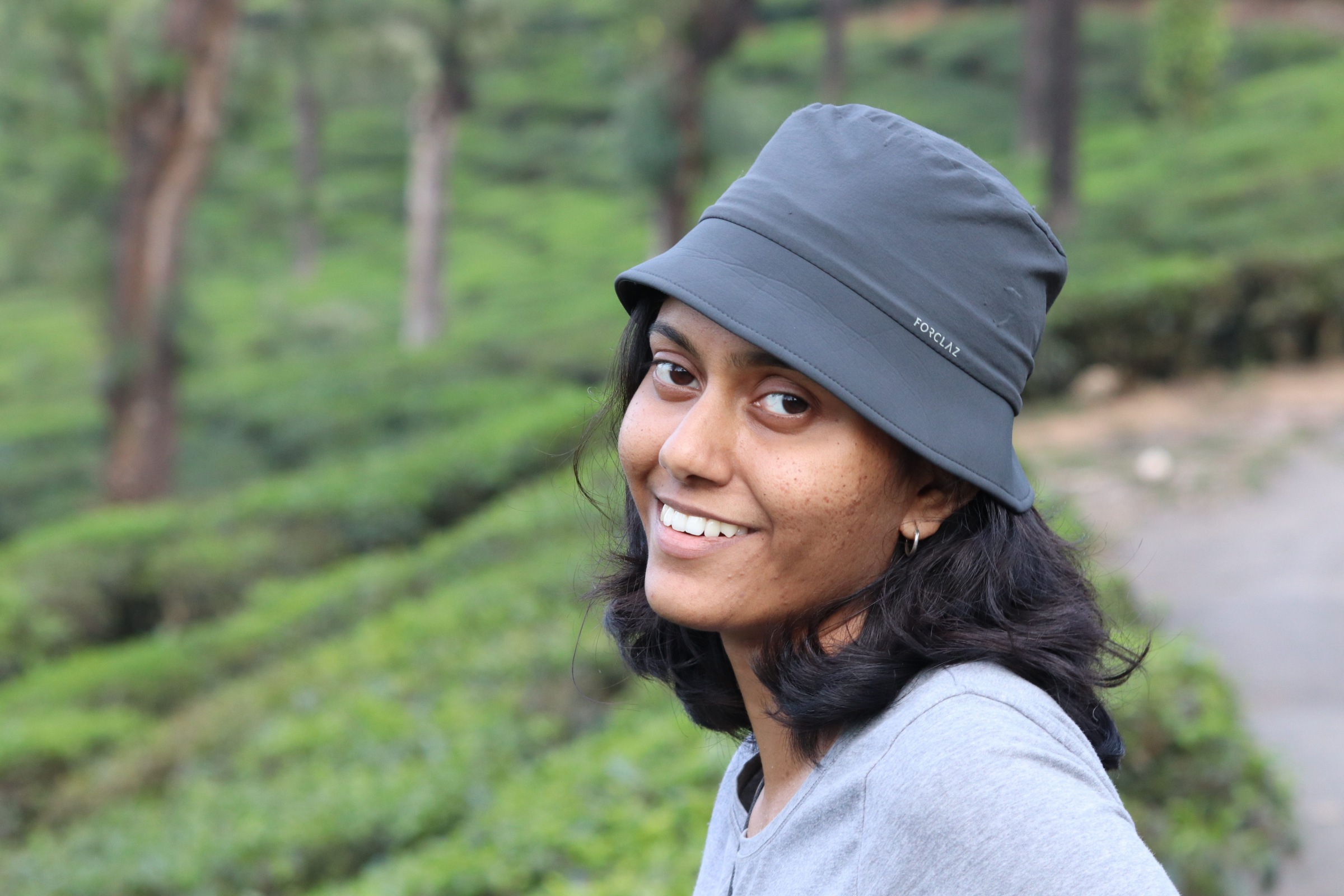In Valparai, from the quiet Nallamudi viewpoint, one has a spectacular view of old forest. One day, I was there to witness mist rolling in and out and obscuring my view of the forest every now and then, and sometimes, I was able to see a Kadar settlement nestled in a clearing of the forest far away. I really believed my day couldn’t get any better, and then two dueting Great Hornbills flew into view. I was moved to tears by the sheer beauty of their flight in the vast expanse of their home that day. I think back to this image every time I need a pick-me-up and remind myself of why I do what I do.
 Nallamudi, in Valparai, without the hornbills
Nallamudi, in Valparai, without the hornbills
This is how my love for birds took shape….
I went to a rather unconventional school in Chennai – Good Earth School – which believed nature had a large part to play in children’s lives. I grew up there with turtles, snakes, crabs, and birds, amidst trees, wide open spaces and agricultural fields. Also helped majorly that my father’s enthusiasm for wildlife rubbed off on me! I did my undergrad in Madras Christian College, in Chennai. The campus was in the middle of a scrub jungle, and I was lucky enough to go to class with someone who already knew birds. I watched birds with him, and eventually got a pair of binoculars. For me, this was a game-changer – watching birds through binoculars allows you to get up close without startling the bird, and that way, I was able to properly see how spectacular they were.
I had done internships while in college and I had an idea of what research in wildlife ecology and conservation looked like. In 2017, for my master’s dissertation, I wrote to Dr Kartik Shanker at the Indian Institute of Science to work with him on a project to understand mixed-species flocks better. I carried out fieldwork in the Kali Tiger Reserve of the Western Ghats. I benefitted enormously from my interactions with Dr Priti Bangal and Dr Hari Sridhar who, alongside Dr Shanker, mentored me throughout the dissertation period. It was exciting to find gaps from existing literature of these flocks and pose research questions that could help address them – and because I designed the study from the bottom up, I was always very interested and invested in it!
I’m a PhD student now (since 2021) at the University of Florida, and for my dissertation, I hope to go back to Valparai to understand how ecological restoration benefits bird communities there. Specifically, I want to study how active restoration and natural regeneration impact mixed-species flocks, and see how these flocks match up to those in protected areas with mature forests. I previously worked in Valparai with Dr TR Shankar Raman to understand how rainforest birds were benefiting from active restoration, and fell in love with the landscape during my time here.
I like to do what I do because….
Like many ecologists, I love being in the field! I don’t know if I could be happy in a city for very long anymore. I also love writing about my work, and the birds and animals I see – my greatest joy is to show other people what I see in the field (with words, I am not artistic in the least). It is an extraordinary honour to be able to live in these wild places, and I am always looking for ways to communicate both science and natural history to an audience that is far removed from it. How can you be passionate about something you don’t know about, or care about? Over the last couple of years, I’ve also enjoyed mentoring and helping other students along this somewhat obscure career path. I know the privileges I have had, and the many people who stopped and helped me – I am committed to giving back.
The challenges I faced….
To be a woman in science is daunting enough on its own, but when you are an ecologist living in remote places, your friends and families worry a lot. I have been fortunate to have met the nicest people in the field. But considering the amount of independent work in challenging field settings we do as ecologists, and the uncertainty that goes with all parts of our job, I do believe we should be having more open conversations about mental health. Personally, I wish there was more of a support network that was open to talking about these issues in this field.
My advice to young researchers..
- Please be respectful of both wildlife and people. It’s really not cool if you’re in a selfie with a tiger cub, or holding a snake in your hands – it’s very unnecessary and outright stressful for the animal. It’s understandable that sometimes we are curious to get the best view of the animal/bird, but please remember your pleasure from watching it always comes second.
- The ecology world in India is dominated by English-speaking upper caste people – if you identify in this manner, please be aware of your privilege, and especially question your viewpoints. They may be coming from a narrow, often skewed perception of the world.
- I am enormously thankful to all my mentors – these people have taken time from their busy lives at so many points and have gone out of their way to support me. These are relationships I have cultivated over the years carefully, and I think it’s important to be proactive about reaching out to people if you need their help. Write and write again if you don’t hear back – people are busy and sometimes they just need a reminder.
- Speak up – the world tends to be alarmed sometimes if you are a young woman and you dare voice your opinion, but do it anyway! You are not arrogant, you are not bossy, and you don’t have an attitude.
Priyanka Hari Haran
PhD Student
Dept. of Wildlife Ecology and Conservation, University of Florida
Email: phariharan1[at]ufl[dot]edu
Twitter: @PriyankaHariH
Writing: https://beakofthetiger.wordpress.com/


I would like to first state, you are very artistic with your words Priyanka. I enjoyed reading this piece, as I could relate to your experience and your challenges.Thats the power of your creative presentation. When you described the day in Valparai,I felt I was there right next to you.
Very happy to see you follow your passion. All the very best.
Priyanka, wonderful to read about your love for nature and your experiences.
Sage words of advice too.
Good luck and success with your research.
Best of Luck in your endeavour. My interest in flora especially underexploited fruit and nuts of India.
Priyanka, it was great reading about your experiences, your thoughts and ideas. Keep the fire within and inspire others with your work.
Best of luck for your work/Phd. Enjoyed reading about your experiences in Valparai.